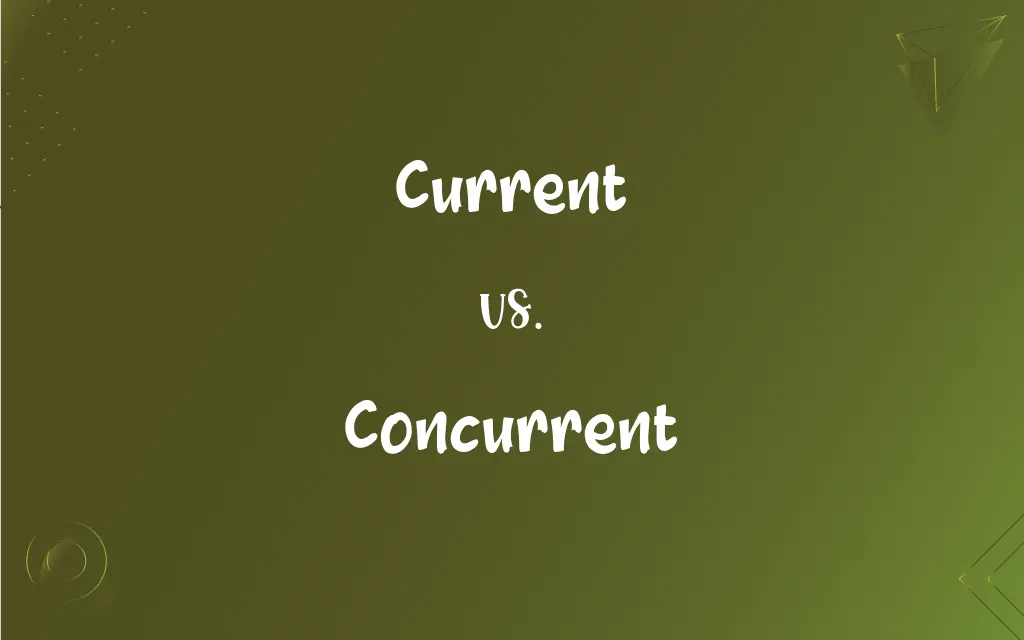Current vs. Concurrent: What's the Difference?
Edited by Harlon Moss || By Janet White || Updated on October 17, 2023
"Current" is not an incorrect spelling for "Concurrent." Concurrent refers to events or situations happening or existing at the same time.

Key Differences
"Current" has a single 'r', while "Concurrent" has double 'r'.
"Current" pertains to the present or something in use, while "Concurrent" implies simultaneous occurrence.
"Concurrent" starts with 'Concu', whereas "Current" starts with 'Curr'.
"Current" is shorter than "Concurrent."
"Concurrent" has the word 'con' in it, hinting at cooperation or together.
ADVERTISEMENT
Current and Concurrent Definitions
Current
Current is an incorrect spelling of Concurrent.
Concurrent
Coinciding in time or order.
There were concurrent releases of the software.
Concurrent
Joint or shared responsibility.
They received concurrent sentences for their crimes.
Concurrent
Happening or existing simultaneously.
There were concurrent meetings in the office today.
Concurrent
Operating or occurring at the same time.
The two systems run concurrent processes.
ADVERTISEMENT
Concurrent
Being in accord or harmonious.
Their plans were concurrent with each other.
Concurrent
Happening, existing, or done at the same time as something else
Dealing with concurrent crises.
Concurrent
Meeting or tending to meet at the same point; convergent
Concurrent lines.
Concurrent
Being in accordance; harmonious
Are these decisions concurrent with university policy?.
Concurrent
Happening at the same time; simultaneous.
Concurrent
Belonging to the same period; contemporary.
Concurrent
Acting in conjunction; agreeing in the same act or opinion; contributing to the same event or effect.
Concurrent
Joint and equal in authority; taking cognizance of similar questions; operating on the same objects.
The concurrent jurisdiction of courts
Concurrent
(geometry) Meeting in one point.
Concurrent
Running alongside one another on parallel courses; moving together in space.
Concurrent
Designed to run independently, rather than sequentially, using various mechanisms, such as threads, event loops or time-slicing.
Concurrent
One who, or that which, concurs; a joint or contributory cause.
Concurrent
One pursuing the same course, or seeking the same objects; hence, a rival; an opponent.
Concurrent
One of the supernumerary days of the year over fifty-two complete weeks; so called because they concur with the solar cycle, the course of which they follow.
Concurrent
One who accompanies a sheriff's officer as witness.
Concurrent
Acting in conjunction; agreeing in the same act or opinion; contributing to the same event or effect; coöperating.
I join with these laws the personal presence of the kings' son, as a concurrent cause of this reformation.
The concurrent testimony of antiquity.
Concurrent
Conjoined; associate; concomitant; existing or happening at the same time.
There is no difference the concurrent echo and the iterant but the quickness or slowness of the return.
Changes . . . concurrent with the visual changes in the eye.
Concurrent
Joint and equal in authority; taking cognizance of similar questions; operating on the same objects; as, the concurrent jurisdiction of courts.
Concurrent
Meeting in one point.
Concurrent
One who, or that which, concurs; a joint or contributory cause.
To all affairs of importance there are three necessary concurrents . . . time, industry, and faculties.
Concurrent
One pursuing the same course, or seeking the same objects; hence, a rival; an opponent.
Menander . . . had no concurrent in his time that came near unto him.
Concurrent
One of the supernumerary days of the year over fifty-two complete weeks; - so called because they concur with the solar cycle, the course of which they follow.
Concurrent
Occurring or operating at the same time;
A series of coincident events
FAQs
Why is it called Concurrent?
It's derived from Latin "concurrere" meaning "run together, meet, assemble."
Which vowel is used before Concurrent?
The vowel "o" is prominent in "Concurrent."
What is the root word of Concurrent?
The root word is "concur."
Is Concurrent an adverb?
No, it's not an adverb.
What is the verb form of Concurrent?
The related verb is "concur."
What is the pronunciation of Concurrent?
It is pronounced as /kənˈkʌrənt/.
What is the singular form of Concurrent?
"Concurrent" is already in singular form.
What is the plural form of Concurrent?
"Concurrents" can be used, though rare.
Which preposition is used with Concurrent?
"With" as in "concurrent with."
Is Concurrent an abstract noun?
No, it's primarily an adjective.
Is Concurrent a noun or adjective?
"Concurrent" is primarily an adjective.
Is the Concurrent term a metaphor?
No, it's a literal term.
Which conjunction is used with Concurrent?
Any conjunction can be used, depending on the sentence.
Is Concurrent a collective noun?
No, it's not a collective noun.
How many syllables are in Concurrent?
There are three syllables in "Concurrent."
What is the first form of Concurrent?
Not applicable, as "Concurrent" primarily functions as an adjective.
What is the second form of Concurrent?
Not applicable.
What is the third form of Concurrent?
Not applicable.
Which article is used with Concurrent?
"The" or "a" can be used, e.g., "the concurrent events" or "a concurrent theme."
Is Concurrent a negative or positive word?
Neutral, its connotation depends on context.
Is Concurrent a vowel or consonant?
"Concurrent" is a word containing both vowels and consonants.
Is Concurrent a countable noun?
Generally, it's not considered countable when used as a rare noun.
Which determiner is used with Concurrent?
Determiners like "the," "this," "that," "my," "his," "her," etc. can be used depending on context.
How do we divide Concurrent into syllables?
It is divided as Con-cur-rent.
What is a stressed syllable in Concurrent?
The second syllable "cur" is stressed.
What part of speech is Concurrent?
It's an adjective.
What is another term for Concurrent?
"Simultaneous" or "coexistent."
Is the word Concurrent is imperative?
No, it's not imperative.
What is the opposite of Concurrent?
"Non-concurrent" or "sequential."
How is Concurrent used in a sentence?
"The two events are concurrent, making it difficult to attend both."
About Author
Written by
Janet WhiteJanet White has been an esteemed writer and blogger for Difference Wiki. Holding a Master's degree in Science and Medical Journalism from the prestigious Boston University, she has consistently demonstrated her expertise and passion for her field. When she's not immersed in her work, Janet relishes her time exercising, delving into a good book, and cherishing moments with friends and family.
Edited by
Harlon MossHarlon is a seasoned quality moderator and accomplished content writer for Difference Wiki. An alumnus of the prestigious University of California, he earned his degree in Computer Science. Leveraging his academic background, Harlon brings a meticulous and informed perspective to his work, ensuring content accuracy and excellence.































































